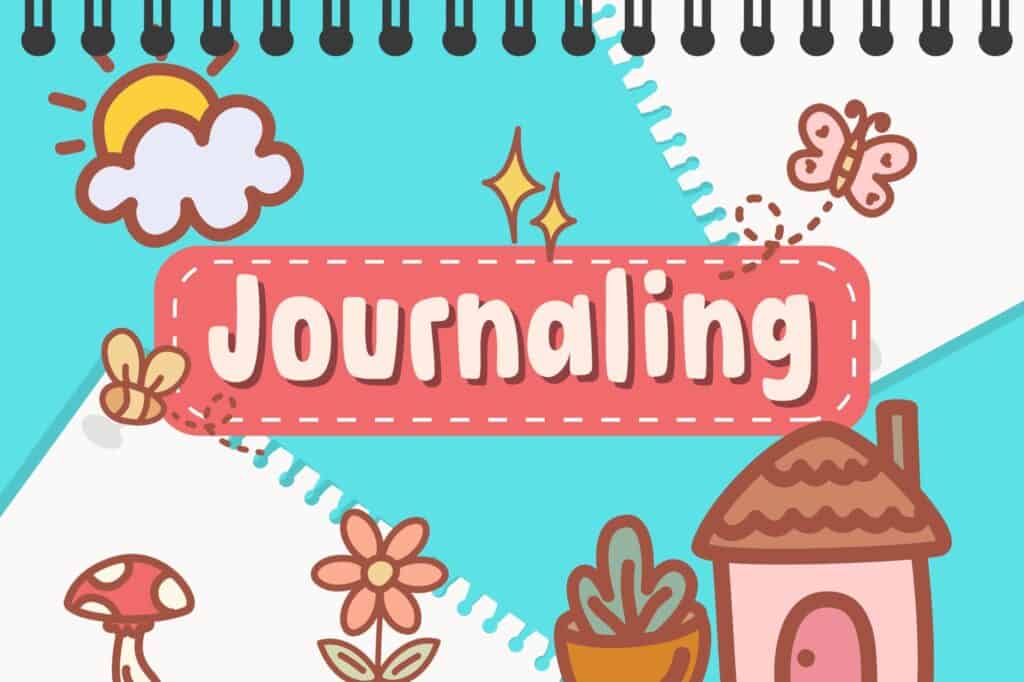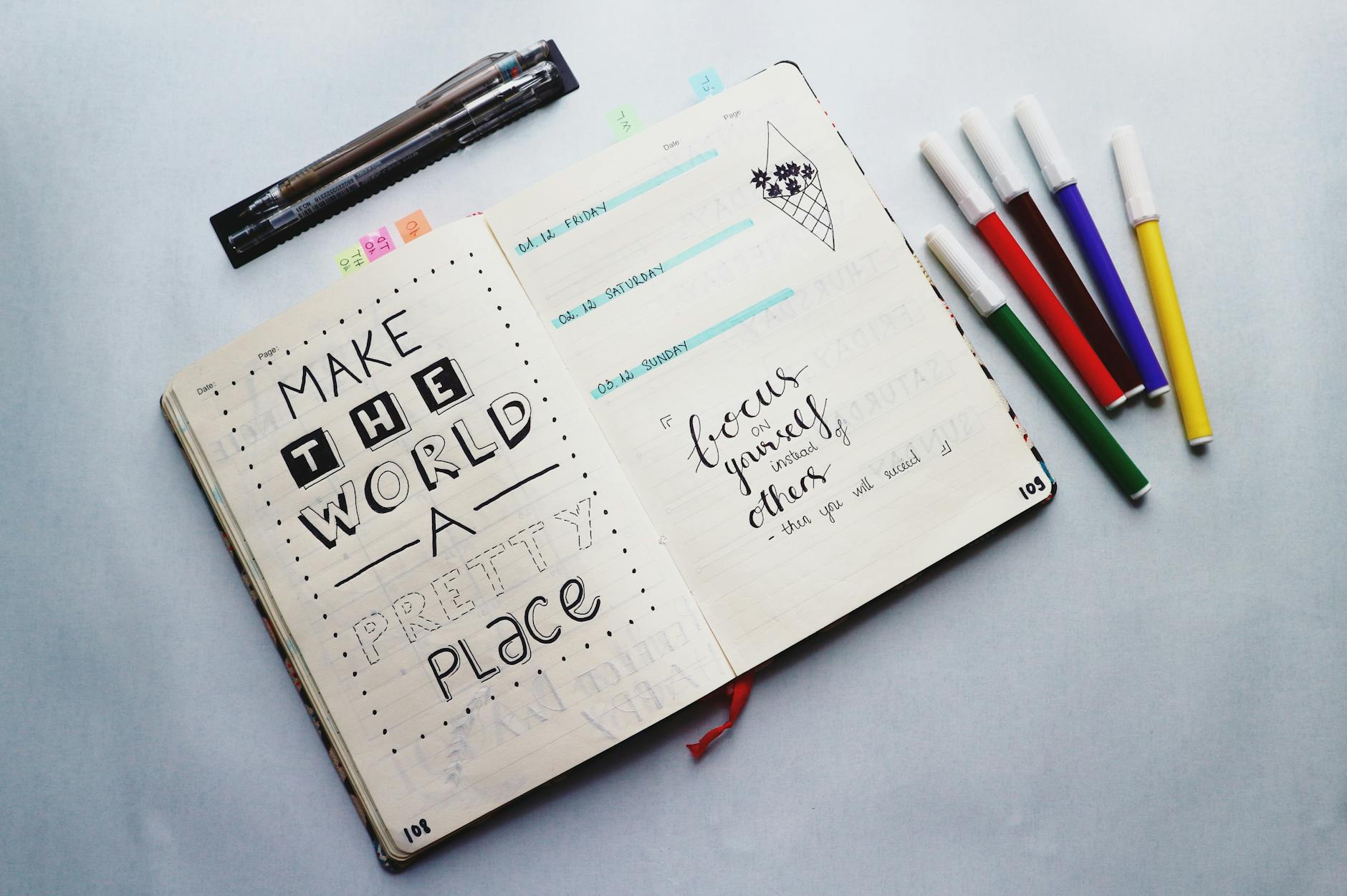Last updated on August 25th, 2025
Do you ever feel like your head is just… too full? Like your thoughts are tangled up, and it’s hard to focus?
That’s where journaling for mental clarity can help. Writing things down, even just for a few minutes, can make whatever’s in your mind feel lighter and clearer.
It’s like sweeping the clutter out of your brain and making space for calm and clarity.
Do you want to know how this simple habit could make a big difference?
Even if you’re jotting down your feelings or setting daily goals, journaling might be that tool you didn’t know you needed.
Journaling for mental clarity, along with other effective self-care practices, has been linked to improved emotional well-being and mental focus.
What Is Journaling?
Journaling is like giving your mind a way to breathe. It’s a personal practice where you jot down your thoughts, feelings, or even ideas just to make sense of them.
Look at it as a way to hold a friendly conversation with yourself on paper.
The Basics of Journaling
Basically, journaling is the act of writing down your thoughts and feelings to express yourself and gain clarity.
It’s like emptying a cluttered drawer—you get to sort through everything and make room for what really matters.
Even if you’re feeling overwhelmed, happy, or somewhere in the middle, journaling welcomes it all. No rules, no pressure, just you and your words.
Some people turn to journaling to track daily events, brainstorm ideas, or process emotions. It’s a tool to clear your mind and understand what’s been swirling inside it.
And the beauty of it is that you only need a pen and paper—or a trusty app if digital journaling is more your thing.
Photo by Bich Tran
Different Styles of Journaling
Journaling is not one-size-fits-all. Different styles make it easy to find one that fits your mood or goals. Here are a few popular types people swear by:
- Gratitude Journaling: Write down things you’re thankful for each day. This can be as simple as “sunshine” or “a tasty cup of coffee.” It’s great for shifting your mindset and focusing on positives.
- Bullet Journaling: This method combines organization and creativity. With bullet points, trackers, and customizable layouts, it’s perfect for staying on top of your schedule while expressing yourself.
- Free Writing: If structure isn’t your thing, free writing might be ideal. Just write whatever comes to mind, without worrying about grammar or form. This style is perfect for brain dumps or untangling stressful thoughts.
Do you want to dive deeper into self-care while exploring journaling alongside other nurturing activities? You might enjoy “19 Budget Friendly Self-Care Activity Ideas” for inspiration.
Each journaling style serves a unique purpose, so don’t be afraid to experiment and figure out what feels natural for you.
Even if you’re practicing gratitude, drawing colorful layouts in your bullet journal, or letting your thoughts spill out freely, there’s no wrong way to do it!
How Journaling Boosts Mental Clarity
Journaling is not just putting words on paper—it’s like untangling a messy knot in your brain. Through writing down thoughts and emotions, you can make sense of chaos and gain a clearer perspective.
It’s amazing how this simple habit can change how you understand yourself and pave the way for self-growth. Let’s look at how journaling elevates mental clarity through a few key practices.
Clearing the Mind: How Writing Organizes Thoughts
Have you ever felt like your brain is a crowded room filled with random chatter? That’s where journaling comes in—it’s a decluttering tool.
Writing your thoughts forces you to slow down and organize what’s buzzing in your head.
Picture this: your mind as a chalkboard, and your worries scribbled all over it. Journaling is like grabbing an eraser and starting fresh. It lets you:
- Prioritize what’s truly important.
- Break down overwhelming problems.
- Create actionable steps to tackle challenges.
For some, morning pages—a practice of writing freely first thing in the morning—help clear mental fog. Others prefer jotting things down at night to “dump” the day’s worries before bed.
Want to start? Try letting your words flow without judgment. It’s all about creating space in your mind.
If you’re interested in improving mental clarity and confidence, check out our guide on 8 Mindset Shifts to Boost Your Confidence for inspiring tips!
Photo by Anastasia Shuraeva
Enhancing Self-Reflection: Understanding Your Emotions
Journaling can feel like talking to a wise, nonjudgmental friend. It’s a safe place to explore questions like: Why do I feel this way? What triggered this reaction?
Through writing down your feelings, you’re practicing self-awareness. It helps you spot patterns in your emotions and behaviors.
You might notice, for instance, that stressful days correlate with skipped meals or lack of sleep. Once you realize this, you can act to make positive changes.
Journaling for emotional awareness has real mental health benefits.
According to research from WebMD, writing your feelings helps you better understand challenging situations and reduces negative emotions tied to those experiences.
Don’t overthink it—just write the first thing that comes to mind.
Over time, this emotional “mapping” strengthens your ability to face challenges head-on without getting lost in hurt or stress signals.
Setting Goals and Tracking Progress: A Journal for Growth
Writing things down makes goals feel real. Even if it’s a big career move or a simple self-care routine, journaling brings those plans out of your head and into focus.
With every journal entry, you’re paving a road to self-discipline and improvement.
You can:
- Set clear intentions. Writing something small, like “drink more water today” or “complete one task,” sets a motivational tone.
- Track growth. Use your journal to note milestones and reflect on your progress.
- Stay accountable. Flipping back to see how far you’ve come feels incredibly satisfying.
This process works even better with tools like bullet journals. Add exciting visuals or simple trackers to make goal-setting both fun and productive.
If you’re new to self-improvement through mindfulness, journal prompts can keep things interesting.
Journaling reminds us that progress doesn’t happen in leaps; it’s a steady climb paved by small, thoughtful steps every day.
And with every page you write, you’re not just tracking your journey—you’re living it.
Discover more ways to make journaling your ultimate growth companion in 15-Day Confidence Plan.
Practical Tips for Effective Journaling
Journaling can be a game-changer when it comes to boosting mental clarity, but getting started might feel overwhelming for some.
Don’t worry—it’s simpler than you think. A few small tweaks in how you approach journaling can make a world of difference.
Let’s break down some practical, easy-to-follow tips so you can dive in confidently!
Photo by Bich Tran
Finding the Right Time to Journal
Timing matters more than you might think when it comes to building a lasting journaling habit.
Some people love the peacefulness of morning journaling, reflecting as they sip coffee or prepare for the day ahead.
Others find evening journaling perfect, using it to unwind and process the day’s events.
Here’s a quick way to figure out what works for you:
- Morning Journaling: Great for setting intentions or starting the day with a clear head. It feels like hitting a mental reset button.
- Evening Journaling: Helps unload daily stresses or capture moments of gratitude. It’s calming and can even improve your sleep quality.
- Midday Break: Short on time? A quick session during your lunch break can be refreshing.
Experiment to find a routine that aligns with your lifestyle. Flexibility is key—don’t force a time that doesn’t feel natural.
Choosing Your Tools
The tools you use for journaling can shape your overall experience.
Feeling undecided between digital and traditional options? Let’s break it down:
- Traditional (Pen and Paper): Perfect for slowing down. There’s something therapeutic about writing by hand. Opt for a pretty notebook or even simple lined paper—you choose!
- Digital Journaling Apps: Want convenience? Apps like Evernote or Day One let you journal on the go and organize entries effortlessly. Plus, they’re searchable!
At the end of the day, it’s all about comfort. Some people even blend the two—using a notebook at home and typing on-the-go thoughts using their phone.
Crafting Your Journal Routine
A habit sticks best when it’s part of your daily rhythm. But how do you make journaling a consistent practice rather than a someday thing? Here are some ideas:
- Set a Reminder: Place your journal on your nightstand or set an alarm. Make it unavoidable.
- Start Small: No need to write essays. Even a single sentence counts: “Today was good because __.”
- Pair It With Another Habit: Journal after brushing your teeth or drinking your morning tea. It’s easier to remember when it’s tied to something you already do.
- Use Prompts When Stuck: Questions like “What made me smile today?” or “What’s one thing I’m grateful for?” work wonders for those blank-page moments.
Consistency is key, but don’t beat yourself up if you miss a day (or five). The goal is progress, not perfection.
Now, it’s your turn—where will journaling fit into your life?
Real-Life Benefits of Journaling
Journaling has this quiet power to make your thoughts feel more manageable. It’s simple, like having a one-on-one chat with yourself.
Beyond clearing mental clutter, journaling can actually reshape daily habits and emotional patterns.
Let’s dig into some of the real-life advantages this practical habit offers.
Increased Focus and Productivity
If you’ve ever felt like tasks are slipping through the cracks, journaling might be your secret weapon. Writing things down helps keep your priorities front and center.
Through jotting your goals or “to-do” lists in one place, you can create a roadmap for the day.
Here’s why many find more focus after journaling:
- Decluttering your brain: It’s like downloading your mental chaos onto paper. This innate organizing helps you work smarter, not harder.
- Boosted accountability: When it’s written, it feels more real. A quick glance at your journal can pull you back on track during the day.
- Breaking big tasks into small ones: When faced with overwhelming projects, journaling can simplify them into smaller, doable steps.
Feeling overbooked? Try jotting down quick “daily intentions” in your morning journal. Something as simple as, “Focus on one task at a time,” can make all the difference.
For more strategies on maintaining confidence at work, take a peek at our detailed How to Be More Confident at Work: 20 Effective Tips.
Photo by Mart Production
Emotional Wellness
It’s easy to bottle things up until they feel too heavy. Journaling gives you that rare, safe space to unload. It allows you to process thoughts you might not even realize are weighing you down.
By writing regularly, you can expect:
- Stress reduction: Journaling has been linked to decreasing cortisol levels, our body’s stress hormone. Think of it as a pressure valve for negative thoughts.
- Sorting emotions: Words help us label and make sense of feelings. Overwhelmed? Angry? Putting emotions into words gives them less control.
- Building resilience: Over time, seeing your challenges in writing helps you feel more prepared to handle them in the future.
Research on the neuroscience behind journaling explains how this habit calms our brain’s fight-or-flight response, leaving us more grounded.
Understanding and managing emotions becomes second nature with consistent practice.
If you’re ready to dive deeper into nurturing emotional clarity, our Self-Love as the Cure: How to Stop Feeling Like a Burden explores actionable shifts to uplift your mindset.
Journaling is more than just a notebook and pen—it’s a quiet revolution in your mental and emotional world.
From tackling daily life to unpacking our feelings, it offers real, lasting benefits you can feel and see.
Why not let it be your stress-busting companion?
Wrapping Up Journaling for Mental Clarity
Journaling acts as a simple yet powerful tool to improve mental well-being. It’s just like you are having a private therapy session whenever you need it.
You pick the topic, set the pace, and guide your reflections—all without judgment or rules.
By making it a habit, you give your thoughts a home and open the door to clarity and peace.
If you are curious about creative prompts to begin with? This 800+ Journal Prompts I put together is a good place to start.
Explore more tools to stay mentally grounded with tips on “Empowerment on a Budget: The New Freedom” or learn how this habit can transform larger themes in life, like “Defining Success and Happiness for a Fulfilled Life in 2025“.
Loved this post? Subscribe to PheelPretty for regular self-care ideas and lifestyle hacks to help you feel your best every day





